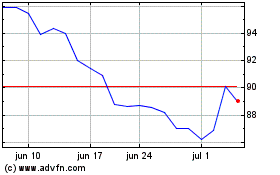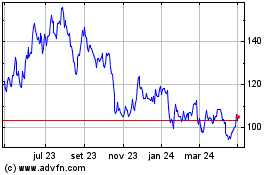Baidu Places Order for Huawei AI Chips Instead of Nvidia Sources
07 Novembro 2023 - 7:30AM
IH Market News
Baidu (NASDAQ: BIDU) commissioned artificial intelligence chips
from Huawei this year, said two people familiar with the matter,
adding to signs that U.S. pressure is leading China to embrace the
company’s products as an alternative to Nvidia (NASDAQ: NVDA).
One of the sources said that Baidu, one of China’s leading AI
companies operating the large Ernie (LLM) language model, placed
the order in August, before the widely anticipated new rules by the
U.S. government in October that strengthened restrictions on chip
exports and chip tools to China, including those from the American
chip giant Nvidia.
The information comes from Reuters.
Baidu ordered 1,600 Huawei Technologies Ascend AI 910B
chips—developed by the Chinese company as an alternative to
Nvidia’s A100 chip—for 200 servers, the source said, adding that in
October, Huawei delivered more than 60% of the order, or around
1,000 chips, to Baidu.
The second person said the total value of the order was
approximately 450 million yuan ($61.83 million), and Huawei was
expected to deliver all the chips by the end of this year. Both
sources declined to be identified because the details of the
agreement were confidential.
While the order is small compared to the thousands of chips that
major Chinese tech companies have historically ordered from Nvidia,
the sources said it was significant as it showed how some companies
might distance themselves from the American company.
Baidu, alongside Chinese competitors like Tencent and Alibaba,
is known to be a long-time customer of Nvidia. It was previously
unknown that Baidu was a customer for Huawei’s AI chips.
Although Huawei’s Ascend chips are still seen as much inferior
to Nvidia’s in terms of performance, the first source said they
were the most sophisticated domestic option available in China.
“They were ordering 910B chips to prepare for a future where
maybe they couldn’t buy from Nvidia anymore,” said the first
source.
Baidu and Huawei did not respond to requests for comments.
Nvidia declined to comment.
Another source said they have been collaborating with Baidu
since 2020 to make its AI platform compatible with Huawei hardware.
In August, both companies announced plans to deepen compatibility
between Baidu’s Ernie AI model and Huawei’s Ascend chips.
Baidu has developed its own line of Kunlun AI chips, which the
company claims supports large-scale AI computing, but it has mainly
relied on Nvidia’s A100 chip to train its LLM.
After the U.S. imposed rules last year that prevented Nvidia
from selling its A100 and H100 chips to China, the company issued
new A800 and H800 chips as alternatives for Chinese customers,
including Baidu. Nvidia can no longer sell these chips to China due
to the October rules.
HUAWEI OPPORTUNITY
Analysts predicted last month that U.S. restrictions would
create an opening for Huawei to expand in its $7 billion domestic
market. The company has been subject to U.S. export controls since
2019.
The order adds to signs of technological advancements for Huawei
as Beijing invests in its domestic semiconductor industry to help
it catch up with foreign counterparts and urges state firms to
replace foreign technology with domestic alternatives.
Huawei attracted substantial global attention in August when it
unexpectedly unveiled a new smartphone that analysts say uses
internally developed processors with advanced semiconductor
technology, highlighting the company’s progress in chip development
despite sanctions.
In September, Reuters reported that Huawei’s in-house chip
design unit, HiSilicon, had begun shipping newly developed
Chinese-made processors for surveillance cameras to customers in
2023, another sign of resurgence.
Baidu (NASDAQ:BIDU)
Gráfico Histórico do Ativo
De Mar 2024 até Abr 2024

Baidu (NASDAQ:BIDU)
Gráfico Histórico do Ativo
De Abr 2023 até Abr 2024
